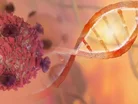Pfizer and Cipla work to counteract the growing number of cancer cases in Africa

Pharmaceutical giants Pfizer and Cipla will be reducing the prices of 16 cancer drugs in a bid to reduce the rising number of cancer cases across Africa, included much needed chemotherapy medication.
Whilst the five-year survival rate for women with breast cancer in the United States is 90%, in Uganda it's just 46%. Cancer kills more people in the region than either malaria or tuberculosis. By 2030, the World Health Organization has now estimated that for every four deaths from HIV/AIDS in sub-Saharan Africa, there will be three deaths from cancer.
The market agreement will be supported by The American Cancer Society (ACS) and the Clinton Health Access Initiative (CHAI) and will improve access for those who cannot afford the rising costs of treatment. This has led to the rise of counterfeit drugs which continue to sold at premium prices. Consequently, Pfizer will only charge just above its current manufacturing costs, whilst Cipla’s medication will range from 50 cents to $10.
The following medicines under Pfizer are: Carboplatin, Cisplatin, Docetaxel, Doxorubicin, Epirubicin, Fluorouracil, Gemcitabine, Leucovorin, Methotrexate, Oxaliplatin and Paclitaxel. The agreement with Cipla will include Anastrazole, Bleomycin, Capecitabine, Carboplatin, Cisplatin, Cytarabine, Oxaliplatin and Vinblastine.
Related stories
- Australia invests $13mn in new medical technologies
- China is looking at ways to eradicate bottlenecks in drug development
- Rising number of measles cases in the US raises important questions
However, Moses Kamabare, general manager of Uganda’s National Medical Stores, the health ministry’s purchasing arm informed the New York Times: “These 16 won’t be enough — they’re about half the range we need.”
“But in terms of value, they are about 75% of our current oncology budget. So, we are really, really grateful for a chance to get better quality at a better price.”
There continues to be a substantial shortage of cancer specialists, where each oncologist is unable to specialise in a particular cancer. The shortage has also led to an increased number of patients who are diagnosed too late, leading to the rising death toll.
To counteract this issue, IBM Health Corps has also collaborated with ACS and CHAI to build the necessary software to enable the ongoing budget and distribution of medicine across Africa.
Additionally, US oncologists will work to break down and simplify complex, hundred-page guidelines surrounding the treatment of each cancer for oncologists within Africa, who would otherwise be ill equipped to support the growing number of cancer patients. IBM will then ensure this information is available in a digital format, making this information increasingly accessible with this online tool.
